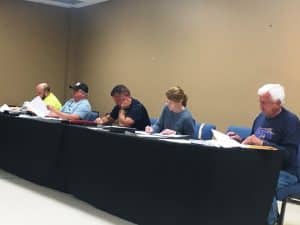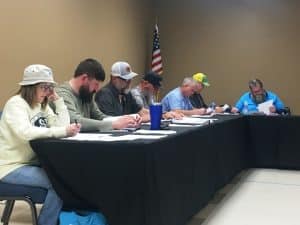March 29, 2025
By: Dwayne Page
The county commission may make a move Monday night toward establishing a building permit system through which the county could collect fees on inspections of new construction rather than the state.
The issue is on the agenda for discussion and possible action based on a recommendation of the county revenue committee. The meeting will be Monday, March 31 at 6:30 p.m. in the auditorium of the county complex.
According to committee chairman Larry Green, who gave a report to the county commission in a workshop last Monday night, builders currently obtain their permits online through the state and the state gets all the revenue from them. The idea is for the permits to be issued by the county and for the county to get the fees. The committee’s hope is that sufficient revenue would be raised through such a local permit program to not only fund the building inspector position but for other county needs.
“We (county) are currently a state regulated building program. We are asking to move us (county) to an exempt program for issuing building permits,” said Green. “It’s the same building codes the state uses now. Its just who gets the revenue from the permits, the state or county,” he said.
The first step is for the county commission to pass a resolution adopting the current state building codes for the county to go by and then hire a local part time building inspector to administer the program.
Green explained that the state would have oversight over the county to ensure compliance.
“I emailed the state and got a step-by-step process on how to do this,” said Green. “The first thing we have to do is approve a resolution adopting the state building codes that everybody already has to go by to build in the state of Tennessee. We would then have to enter into a contract with a building inspector. We have to hire one. He has to be a state of Tennessee certified building inspector in B-1 building, P-2 plumbing, and M-1 mechanical. The committee is recommending that we advertise for a building inspector that meets these qualifications and is certified in these areas,” Green explained. “Then we have to send back a 14-page survey to the state who will have someone go over that survey and then come out and audit us to make sure we have done everything right. Again, what the committee is proposing to do is for the county to follow exactly what the state is recommending as far as adopting building codes, hiring a building inspector, filling out the surveys, and then letting them (state) come out and audit us. Audits are done every three years,” said Green.
Fees generated through the issuance of local building permits would be expected to cover the salary of the part time building inspector.
“We would have to establish his salary. We came up with the same thing the City of Smithville is doing. The city pays their part time building inspector 65% of the building permit fees. The city gets the other 35%,” said Green. “I talked to the property assessor, and he said there is a room in his office that could be used by the building inspector to set up a computer and store his files. We would put the application for a building permit on our (county) website and the contractors could go directly to that and print it from there and then forward everything to the building inspector,” Green said.
“We would start out with a part time building inspector and pay him 65% of the permit costs. The county gets the other 35%. Building permit fees for commercial and residential structures would be based on a graduated scale according to the square footage, with additional costs for electrical inspections done by the state. We would exempt agriculture buildings. If a farmer wanted to build a shop or a barn, he wouldn’t need a permit. And you could build a deck on your house and wouldn’t need a permit. But if you add onto your house more than 30 square feet of living areas you would have to get a permit. That’s state law,” said Green.
“Basically, all this means is right now if you are building a house the contractor is doing this already,” said committee member Mathias Anderson. “They are just having to go through the state and they are paying the state for the permit. All we are doing is basically saying instead of calling Nashville you call the county,” he said.
“My biggest concern would be is there enough building to support this,” said Anderson. “DeKalb County had 165 homes built just in 2024. That was a huge increase from what I looked at previously,” he said. “The other thing is the salary. In a meeting we learned that the standard is a percentage of the fees so its not a salary. Its basically just a 1099. They only get paid when we get paid for the permits. Not anything additional except for the electrical inspection. The permit covers the cost,” said Anderson.
“Being in the real estate industry I have seen a lot of houses that should not have gotten passed and having somebody here to do this (inspection) I think would really improve the building here. Not saying that the state is not doing their job, but I would love to have somebody with an office here to go and check out these houses,” said Commissioner Tony Luna during last week’s workshop.





